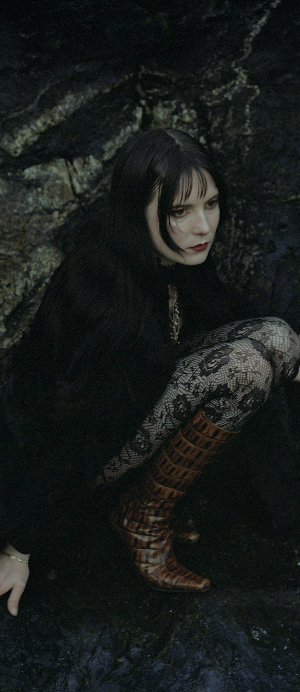TMR TALKS TO...
PUMAROSA
In this interview feature, we get to know the most radicalist up & coming stars on the planet. This time it’s East-London’s psychedelic warriors, Pumarosa - a 5-piece incarnation that while only really being in existence for little more than a year and a half, is taking the British indie scene by storm. Once quoted as trying to “work everyone up into a euphoric state,” Pumarosa’s transcendental power is made abundantly clear by their first three singles. Their Dan Carey-produced debut ‘Priestess’ is a propulsive, hypnotic 7-minute wonder that succeeds in streamlining the sprawling opuses of Krautrock pioneers (such as Can and Neu!) without losing any of the genre’s intensity or otherworldliness. Following up on this auspicious beginning, subsequent single ‘Cecile’ further ramps up the momentum with sensuous grooves and an explosive sax solo at the song’s rapturous climax. What is most noteworthy about Pumarosa, however, is that while there is an undeniably psychedelic element to their output, it is a psychedelicism that finds its roots not in the rural rhythms of Nature, but in the pulsing throb of the city. We caught up with Pumarosa on the release of their outstanding new single 'Honey' (via Fiction Records) to learn a little bit more about this singular band and their self-described “industrial spiritual” sound. *** TMR: How is the tour going (with some of your first shows played overseas in recent months)? Pumarosa: It's going great thanks. We've been kind of dotting around, and getting the miles in. It's a lot of travelling, but then it feels so good to be out there playing to all these different crowds, getting a feel for new places. Things are different everywhere, and it's really gratifying to be able to connect with French, Dutch, German, or Norwegian audiences. TMR: You guys have more or less only been a band for a year and a half or so, right? What have been some of the best experiences you have had in this time? Pumarosa: Well, in this form, yes something like that. Probably coming up to two years now. A lot has happened, including some pretty spectacular gigs. I mean, playing at the Royal Albert Hall for the Teenage Cancer Trust has to be one, but then playing in the dangerously dilapidated Ali B's Safehouse in Peckham was excellent in a different, more chaotic, less structurally secure way. Playing, writing and recording in Calabria for a week, at our friend's old cinema was a dreamlike, almost film-like experience. Such a beautiful place, right down in the South of Italy on a cliff-face looking out to sea. TMR: Try as many will to categorise your music, Pumarosa is undeniably a melting pot of many different ideas. What are some of your musical and indeed non-musical inspirations? Pumarosa: Everyone brings something different, but some things we are all inspired by. There's definitely a deference to Massive Attack, and fondness of PJ Harvey, Can, and Radiohead. But as you say, inspiration can come from anywhere. The situation we're in, the place. I think you can say that the films of Adam Curtis, and the sensations of London are there too, amongst innumerable, innominate waves of indecipherable influence. TMR: Why did you originally decide to call this project Pumarosa? Pumarosa: A previous project was called mini puma. Rosa is Isabel's middle name. Pumarosa is a lurid tropical fruit. TMR: People seem to really delight in the expanse of ‘Priestess’. This strikes me as actually quite an uncommon reaction, particularly for more mainstream audiences. I’m sure it’s wonderful to receive this appreciation but what’s the significance of these extended jams for you? Pumarosa: That sense of space can bring a sense of freedom. Jamming is a part of how we spread out and get in touch during rehearsal, and it's the same thing with Priestess, taking the time to really sink into something. It's a gesture of constancy and exploration. TMR: “Industrial Spiritual” – perhaps a term you are getting tired of - but I’d say there is something quite apt in this description. Spiritual/psychedelic/jam music is so frequently associated with rural imagery but your music seems to find its roots and inspiration in the city. Is being in a city important to your music? Is being in London important to your music? Pumarosa: London is an ingrained element in our music. We have all spent a lot of time living, working, partying and everything else here. Aside from the internet, this is our immediate musical environment, and this is the city whose sounds we digest every day, whether it’s a musical performance, or the distinct ambience of the place. TMR: Both Pumarosa videos thus far seem to engage strongly with, or play with, ideas of the physical. Furthermore, most Pumarosa songs I’ve heard are very groove-based. Is physicality/the human body/movement important to you? Pumarosa: Naturally, the physical world speaks to us. And we use our own physicality to express things, like in a dance, as in Priestess. Cecile had that visceral element too, but in the context of something a bit more otherworldly and abstract. We like music that makes that connection to the physical, yes. TMR: Pumarosa are quite a hotly-tipped band at the moment. How do you feel about this sort of hype? How much do you engage with it? Pumarosa: I think we basically try to ignore anything about hype. If it's there then fine, but by its very nature it's not something to be trusted. It's great that there's excitement around, but we're definitely not getting carried away. TMR: We’re a blog specializing in new music so are there any up-and-coming bands you’re really enjoying lately? Pumarosa: Shame are great. And Blood Sport. TMR: What does the rest of 2016 hold for Pumarosa? Pumarosa: A heck of a bleeding lot! We've just announced our first headline UK tour, and we're going to AMERICA and Europe with the Glass Animals. We're deep into recording the album with Dan Carey in between all that. There's a lot of gigs between now and Christmas. Catch Pumarosa on their upcoming headline tour of the UK. -Karl Jawara
Listen



